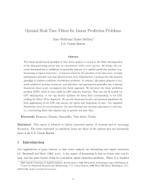
An official website of the United States government
Here’s how you know
Official websites use .gov
A .gov website belongs to an official government organization in the United States.
Secure .gov websites use HTTPS
A lock (
) or https:// means you’ve safely connected to the .gov website. Share sensitive information only on official, secure websites.
-
//
- Census.gov /
- Library /
- Census Working Papers /
- Optimal Real-Time Filters for Linear Prediction Problems
Optimal Real-Time Filters for Linear Prediction Problems
Optimal Real-Time Filters for Linear Prediction Problems
Abstract
The classic model-based paradigm in time series analysis is rooted in the Wold decomposition of the data-generating process into an uncorrelated white noise process. By design, this universal decomposition is indifferent to particular features of a specific prediction problem (e.g., forecasting or signal extraction) { or features driven by the priorities of the data-users. A single optimization principle (one-step ahead forecast error minimization) is proposed by this classical paradigm to address a plethora of prediction problems. In contrast, this paper proposes to reconcile prediction problem structures, user priorities, and optimization principles into a general framework whose scope encompasses the classic approach. We introduce the linear prediction problem (LPP), which in turn yields an LPP objective function. Then one can fit models via LPP minimization, or one can directly optimize the linear filter corresponding to the LPP, yielding the Direct Filter Approach. We provide theoretical results and practical algorithms for both applications of the LPP, and discuss the merits and limitations of each. Our empirical illustrations focus on trend estimation (low-pass filtering) and seasonal adjustment in real-time, i.e., constructing filters that depend only on present and past data.
Others in Series
Working Paper
Working Paper
Working Paper
Share
Related Information
Some content on this site is available in several different electronic formats. Some of the files may require a plug-in or additional software to view.
 Yes
Yes
 No
NoComments or suggestions?


Top

